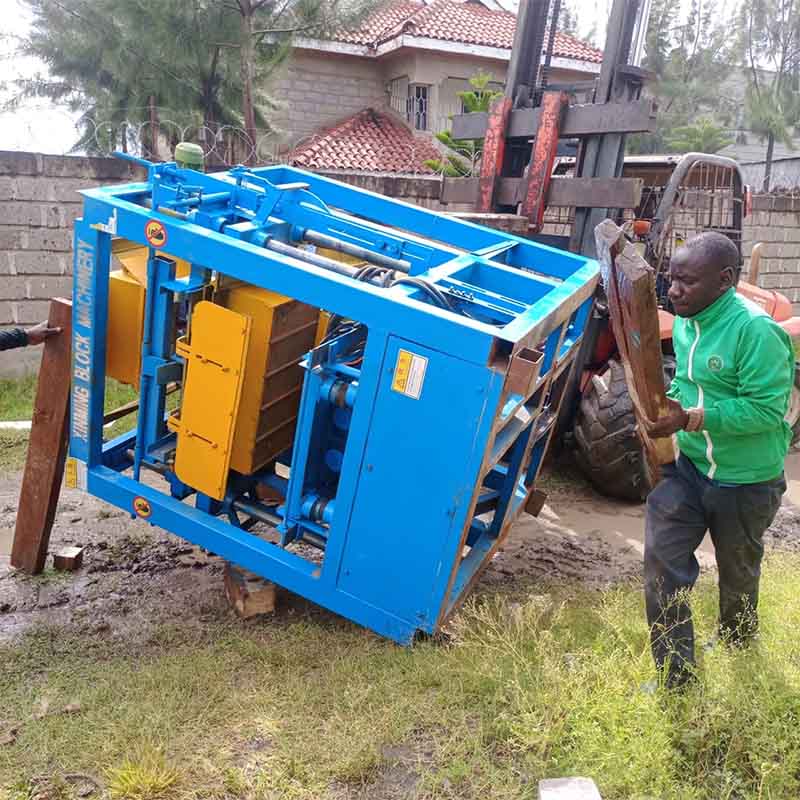
Image source Aiweibrickmachine
Market Differentiation Strategies for Block Manufacturers
Title: Crafting a Niche: Market Differentiation Strategies for Block Manufacturers
Introduction
In a competitive market where consumers are inundated with choices, the success of block manufacturers hinges on their ability to stand out and offer something distinctive. Market differentiation is the key to capturing attention, building a strong brand, and ultimately securing a loyal customer base. This article explores various market differentiation strategies tailored for block manufacturers, emphasizing the importance of innovation, sustainability, customer-centricity, and strategic positioning.
- Innovative Product Offerings
One of the most effective ways for block manufacturers to differentiate themselves is through innovative product offerings. This involves going beyond the conventional concrete block and exploring new materials, designs, and functionalities. For instance, manufacturers can develop blocks with enhanced thermal insulation properties, incorporating technology to improve energy efficiency in construction projects. Innovative shapes, sizes, and surface finishes can also set a manufacturer apart in a market where creativity is often welcomed.
- Sustainability as a Key Differentiator
The construction industry is increasingly embracing sustainable practices, and block manufacturers can capitalize on this trend by prioritizing environmentally friendly production processes and materials. Utilizing recycled aggregates, incorporating green manufacturing practices, and offering eco-friendly block options are all ways to appeal to environmentally conscious consumers. Additionally, manufacturers can communicate their commitment to sustainability through transparent reporting and certifications, establishing a competitive edge in the market.
- Customization and Tailored Solutions
Every construction project is unique, and block manufacturers can differentiate themselves by offering customization and tailored solutions. This involves working closely with architects, contractors, and builders to understand the specific requirements of a project and delivering blocks that align with those needs. Whether it’s custom colors, textures, or dimensions, the ability to provide tailored solutions adds significant value to construction professionals, fostering long-term relationships and setting the manufacturer apart from competitors offering standardized products.
- Quality and Consistency
While product innovation is crucial, maintaining a reputation for consistent quality is equally important. Block manufacturers can differentiate themselves by adhering to stringent quality control measures throughout the production process. Consistency in size, strength, and durability not only instills confidence in construction professionals but also contributes to the reputation of the manufacturer. Certifications and third-party testing can further validate the quality of the blocks, providing a competitive advantage in the market.
- Digital Presence and E-Commerce Platforms
In the digital age, an online presence is no longer optional—it’s a necessity. Block manufacturers can differentiate themselves by investing in a user-friendly website that serves as an information hub for architects, builders, and contractors. Additionally, incorporating e-commerce functionalities allows for direct online sales, catering to customers who prefer the convenience of digital transactions. An intuitive online platform not only facilitates product discovery but also serves as a valuable resource for industry insights, technical specifications, and project references.
- Educational Initiatives and Training Programs
Differentiating in the market goes beyond the product—it extends to knowledge sharing and industry expertise. Block manufacturers can position themselves as thought leaders by offering educational initiatives and training programs. This can include workshops on construction best practices, webinars on emerging industry trends, or even on-site training sessions for construction professionals. By becoming a go-to resource for knowledge, manufacturers build credibility and differentiate themselves as partners invested in the success of their clients.
- Strategic Alliances and Collaborations
Collaborating with other players in the construction ecosystem can be a powerful differentiation strategy. Block manufacturers can form strategic alliances with architects, construction firms, or sustainable building organizations. These collaborations not only expand the manufacturer’s network but also position them as contributors to the larger industry. Joint initiatives, such as participating in construction exhibitions or sponsoring industry events, create opportunities for visibility and reinforce the manufacturer’s commitment to collaboration and innovation.
- Emphasis on Technology and Automation
Integrating advanced technology and automation into the manufacturing process is a significant differentiator. Manufacturers that invest in state-of-the-art equipment and automation solutions can enhance production efficiency, reduce costs, and improve overall product quality. This commitment to technological advancement not only sets a manufacturer apart from those using outdated methods but also positions them as leaders in the industry, capable of meeting the demands of a rapidly evolving construction landscape.
- Transparent Communication and Brand Storytelling
Consumers today are not just buying products; they are investing in the values and stories behind the brands. Block manufacturers can differentiate themselves by adopting transparent communication practices and effective brand storytelling. This involves sharing the journey of the company, its commitment to quality, sustainability initiatives, and the people behind the products. Humanizing the brand creates a connection with consumers, fostering brand loyalty and setting the manufacturer apart as more than just a supplier.
- Customer-Centric Approach and After-Sales Support
Providing exceptional customer service and after-sales support is a potent differentiator. Manufacturers can differentiate themselves by adopting a customer-centric approach, addressing inquiries promptly, and offering assistance throughout the entire customer journey. Going the extra mile with after-sales support, such as providing installation guides, maintenance tips, and warranty information, reinforces the manufacturer’s commitment to customer satisfaction and sets a positive perception in the market.
Conclusion
In a market as dynamic and competitive as block manufacturing, differentiation is not just a strategy—it’s a necessity. Whether through innovative product offerings, sustainability initiatives, customization, or a combination of these, manufacturers that set themselves apart are more likely to capture the attention of architects, builders, and contractors. The key is to continually assess market trends, embrace technological advancements, and stay attuned to the evolving needs of the construction industry. By implementing effective differentiation strategies, block manufacturers not only carve a niche for themselves but also contribute to the overall advancement and innovation within the construction sector.
